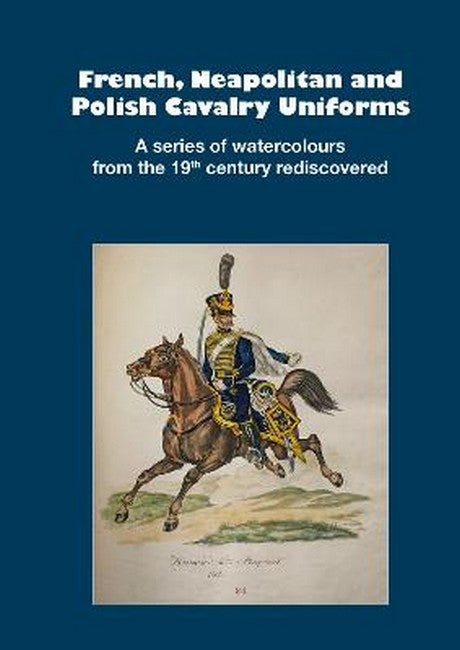Description
A proverbial cellar find brought to light a remarkable source for Napoleonic uniformology, which due to its artistic design but also high level of detail offers valuable support in the research of the military dress of Napoleonic mounted troops. A total of 56 large-format hand-coloured watercolours depict cavalry, artillery and train troops of the French Imperial period from 1804 to 1812, the Neapolitan army of 1812, and the Polish uprising of 1831. The work itself is introduced with a foreword by art historian Dr. Hans D. Baumann, commenting on the artistic representation and especially the provenance of the portfolio. It turned out that the watercolours by unknown artists were originally part of the library of the Royal Theatre in Berlin and finally reached Kassel via the salt mines of Thuringia in the course of the Second World War. From there they went to a private collector and then disappeared in the afore-mentioned cellar. The reference to the Royal Theatres in Berlin as well as the posture and presentation of some of the depicted cavalrymen quickly led to Richard Knoetel's famous Grosse Uniformenkunde. This is because this doyen of German uniformology cited "coloured hand drawings from the library of the Royal Theatre of Berlin" as the source of some of his plates on the French army. His plates on the Neapolitan army are also partly based on the original source presented here for the first time. Even though the artist (or artists) probably did not produce the 56 watercolours until the late 1830s or 1840s, they are captivatingly accurate and have been assessed by Markus Gartner and Markus Stein for their historical accuracy. Each plate is accompanied by a brief commentary, which usually classifies the depiction as correct - especially the rarer depictions, such as French carabiniers around 1812 in the sky-blue uniforms, underline the artist's sound knowledge of Napoleonic military costume. As evidence of the painting's contemporary origins, some plates are accompanied by illustrations by early 19th century military artists such as Martinet or Weiland, which obviously served as sources. Some illustrations are also supplemented by Knoetel's plates, enabling readers to verify for themselves the impact these watercolours had on the creation of a work of such fundamental nature as the "Grosse Uniformenkunde". Thus this book spans 19th century uniformology from the early years to its perfection around 1890. In addition to the commentaries, the plates are also accompanied by historic details outlining the development and wartime deployment of the unit depicted, as well as the standards carried. These additions were made on the basis of rarer works of French military history, while modern works by military historians Markus Gartner and Markus Stein were also consulted. Since the paintings depict mounted units throughout (both of the Guard and the Line), the reader is able to obtain a comprehensive picture of the splendour of Napoleonic cavalry turned out in their colourful uniforms. The artistic charm of a previously unpublished source and the wide range of units represented will surely make this book a highlight of any library.

